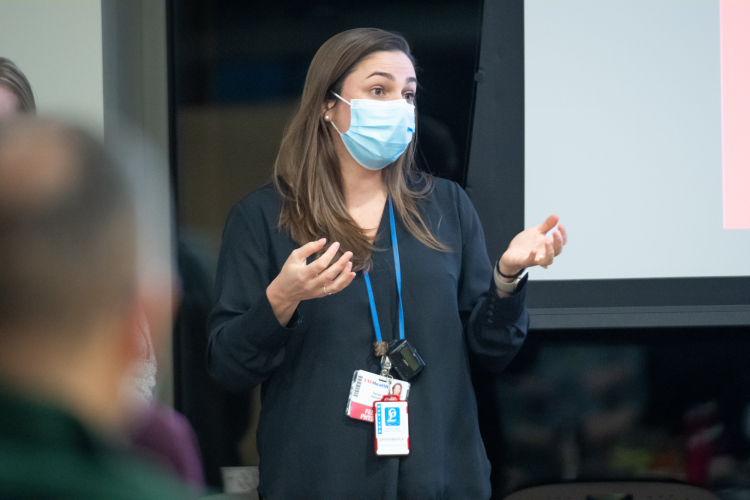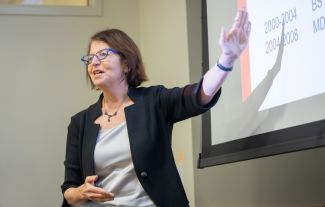WILD Program promotes professional advancement of women fellows

As a resident, Sarah Donohue, MD, fellow, Rheumatology, had many wonderful mentors to guide her career. However, when she wanted to understand more about what it meant to be a woman in medicine and how to navigate the unique challenges female-identifying physicians face, she realized most of her mentors were men. Identifying a need for more female mentors sparked an interest in learning more about the experiences women in medicine have and how to empower women to advocate for themselves and their career.
That interest led to a capstone project on the history of women in medicine, a Grand Rounds presentation, and a new program, launched in 2021, that brings fellows together to empower one another and create a sense of community.
The program, Women in Leadership and Development (WILD), is a certificate for fellows in the Department of Medicine designed to provide a toolkit for career advancement, targeting skills to negate systemic gender bias and inequities in medicine.
“As a woman in medicine, we face constant sexism and discrimination, and it can weigh very heavily on you, day to day, as you go through medical training you see that your experience is different from those that identify as male,” she says.
She goes on to explain that not only is it important to create a community with women in medicine, but also with other fellows.
“I really wanted to create a community around this group. Fellowship is really hard and can feel isolating. You go from a residency program of over 90 people to a fellowship where you’re one of three people,” Dr. Donohue says.
She learned of the idea for the WILD Program after connecting with fellows from the University of California San Francisco (UCSF) while at the Massachusetts General Hospital Women in Medicine Trainee Summit.
“Through my interactions with UCSF faculty, I thought, ‘ok, we need this here.’ We don’t have anything like it at the University of Wisconsin, we don’t have anything like it in the department, and we really don’t have anything like it specifically for fellows.”
With support from Dana Ley, MD, fellow, Gastroenterology and Hepatology, Shobhina Chheda, MD, MPH, professor, General Internal Medicine, as faculty advisor, and Kara Westmas, MS, fellowship coordinator, Administration, as administrative support, the WILD Program at the UW Department of Medicine came to fruition.

The first session took place in September 2021, and it will run through June 2022.
The program offers six sessions on topics like CV writing, shaping leadership identity, and advocacy and empowerment. To fulfill the program and earn the certificate, each participant must attend three of the six sessions.
As the program’s pilot year, it was offered to all fellows in the Department of Medicine. However, Dr. Donohue says that she hopes to receive funding for WILD and expand to internal medicine residents, as well.
In addition to empowerment sessions, the WILD Program also offers ad-hoc mentorship and is always looking to recruit faculty to mentor and lead sessions.
Through the various sessions and connections made between fellows, Dr. Donohue ultimately hopes participants walk away from WILD feeling empowered.
“I hope people feel empowered. I want us to have leveraging power and knowledge. I want us to be able to advocate for ourselves and for what we deserve, and I want us all to have a platform to feel safe,” she says.
Banner: Dr. Donohue speaks at the WILD session on November 15, 2021. Credit: Clint Thayer/Department of Medicine.